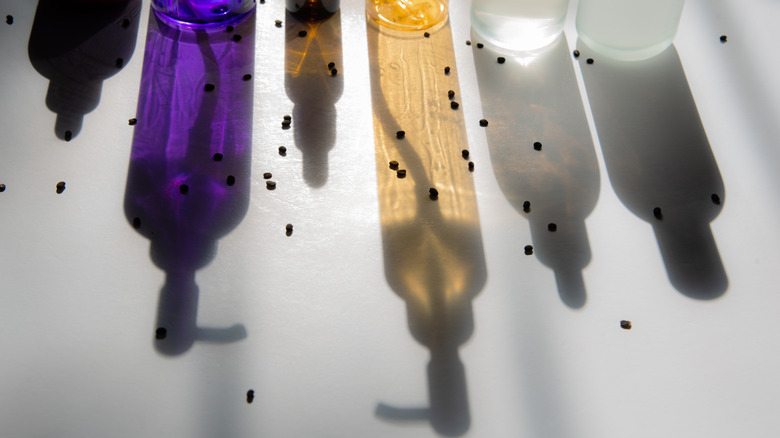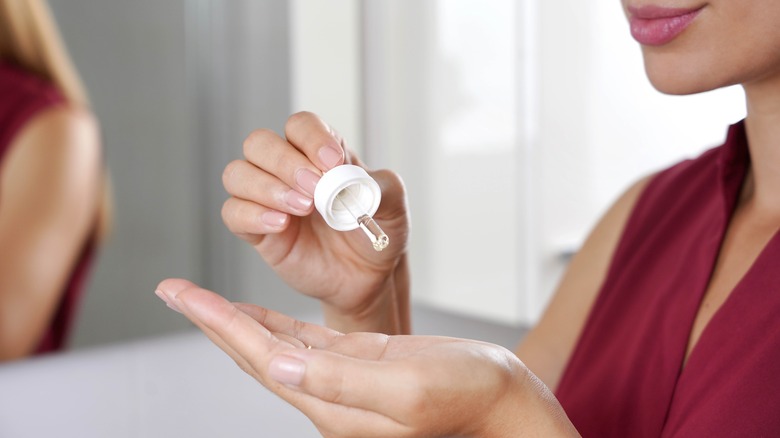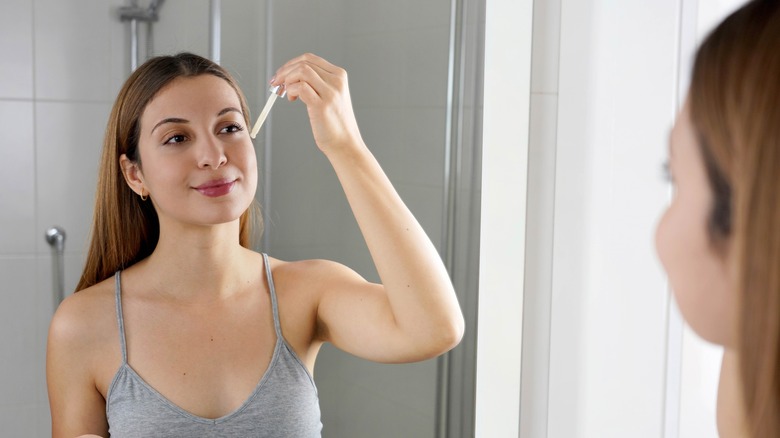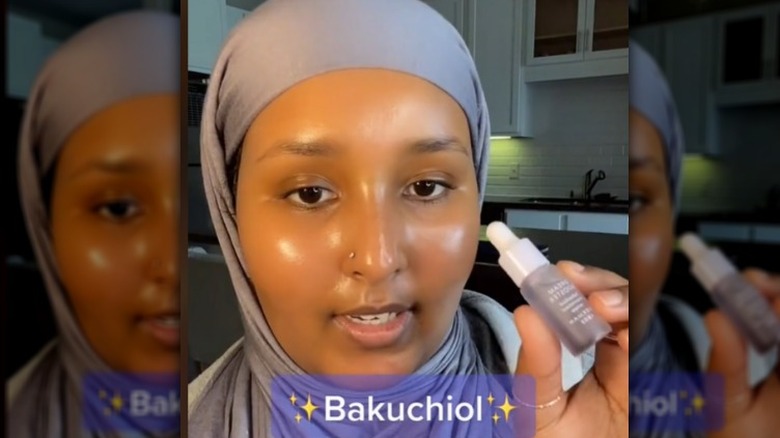Is There Really Enough Research To Position Bakuchiol As An Effective Retinol Alternative?
We may receive a commission on purchases made from links.
For most people, finding the right anti-aging products is a never ending exercise of trial and error. And so whenever a new ingredient is slingshot across the internet to instant glory as the new holy grail, it's hard not to be excited, even if more research is needed. Bakuchiol, seemingly pronounced "ba-koo-chee-all" or "ba-koo-kee-all," is the latest skincare phenomenon that has consumers crazed. Bakuchiol is an extract from Psoralea corylifolia, or babchi seeds, which come from an herbcalled Bu Gu Zhi commonly found across the Himalayas called Bu Gu Zhi .The plant hasa history of being used in traditional Eastern medicine practices, but in recent years, its seeds have won over skincare aficionados for offering anti-aging benefits. These days, the ingredient is popping up creams, serums, and moisturizers galore, promising the same effects as a retinol, without the frustrating reactions.
Before we go any further, you need to know one thing. Bakuchiol is not a retinoid, nor is it a plant version of retinol. True Retinol is type of retinoid, which is a form of synthetically developed vitamin A. Bakuchiol is a completely separate, genetically different, plant-derived compound, that may act similarly on the skin to a Retinol.
In any case, with more than 120 million videos under the bakuchiol hashtag on TikTok, it's clear this new ingredient isn't going anywhere anytime soon. But is there really enough evidence to call it a retinol replacement?
Bakuchiol may have anti-aging properties
Retinol and bakuchiol may not be the same, but they share certain characteristics. "Much like a retinol, bakuchiol triggers the genetic pathway in skin cells to create several types of collagen that are useful in skin health and anti-aging," dermatologist Dr. Rachel Nazarian told Byrdie.
Board certified dermatologist Dr. Luke Maxfield explained in a TikTok that while bakuchiol does not take the same path to the skin as retinols do, its positive effects on the skin have proven similar. He continued that both ingredients are capable of addressing rough skin texture, fine lines, and dark spots, while promoting brightness and firmness. One oft cited double-blind study published by the British Journal of Dermatology in 2019 about the anti-aging effects of bakuchiol found that the plant extract can, in fact, reduce signs of aging in the skin. Comparing bakuchiol directly against its chemical competitor, retinol, over 12 weeks, 44 patients used either 0.5% retinol daily or 0.5% bakuchiol twice daily, and documented any side effects they saw during treatment. "Bakuchiol and retinol both significantly decreased wrinkle surface area and hyperpigmentation, with no statistical difference between the compounds," the study concluded. And, in fact, those who used retinol reported symptoms of skin irritation, where those who used bakuchiol did not.
It may not be necessary if your skin tolerates retinol
According to licensed esthetician Jordyn Oakland, who goes by @rollerskatingesthetician on TikTok, the excitement around bakuchiol could result in a let-down for consumers. As promising as bakuchiol is, it's almost totally unnecessary for most people. Oakland reiterates that most people can tolerate a traditional retinol, though the side effects are unpleasant at first. Once your skin adjusts, you can reap the benefits completely after consistent use. She also notes that brands might not disclose what percentage of bakuchiol is used in a given product formulation, implying that the strength of retinol used can be easier to measure and properly dose overall. This means results could vary, especially if you're hoping for those same proven anti-wrinkle effects that a traditional retinoid provides. Moreover, due to the breadth of research on retinol and retinoids, and the comparatively little research done on bakuchiol, many dermatologists still consider retinol the safest, most effective option on the market right now.
Still, as Vogue India points out, its totally fine for those who want the guarantee that a product is vegan and plant-based to use bakuchiol in place of retinol. However, it's worth noting that much of the retinol used in skincare is synthetically derived and likely vegan-friendly as is.
Using bakuchiol in addition to retinol could be beneficial
Although more research is needed to assess whether long-term use of bakuchiol can truly be an effective replacement for retinol, it may still be worth adding to your routine.
An even more recent study published in 2022 by the International Journal of Cosmetic Science again affirmed the anti-aging properties of bakuchiol, while also positing that bakuchiol has antioxidant effects that Retinol does not. The study also found that bakuchiol could increase skin cell turnover by "upregulating" keratinocytes, which make up the epidermis, and increasing fibroblast production, which make up the skin's tissue. Fibroblasts also create collagen, which keeps the skin strong. All of these mechanisms taken together means that bakuchiol exhibits powerful anti-aging capabilities.
Researches additionally noted that retinoids are prone to degrading after being exposed to light. Bakuchiol, on the other hand, is photostable, meaning that it is not affected by light, and thus can be used during the day and night. Per another 2015 study, when bakuchiol is applied with retinol, it can have a stabilizing effect when exposed to light, meaning that both the retinol and bakuchiol could work together to enhance the efficacy of each. Medical aesthetician Amy Peterson told CNN that bakuchiol is most effectively used as a supplemental day-time anti aging product, while retinol is best for your evening routine.
What to look for in bakuchiol
After making a mental list of the pros and cons, you may be asking yourself, is bakuchiol even worth trying? The answer is that it depends. Those with sensitive or drier skin, along those who have specific skin conditions, such as rosacea, may find bakuchiol a more encouraging anti-aging alternative without the side effects of retinol. Those with acne-prone skin or oily skin can also potentailly benefit from bakuchiol, as it can be safely combined with other active ingredients, like salicylic acid.
The other benefit of Bakuchiol, unlike any retinoid product, can also be used during pregnancy and while breastfeeding. It is also a natural product, unlike most retinoids, which are, in general, synthetics produced in a lab. But like any botanical extract, exercise caution when using for the first time and watch for any adverse reactions.
Ultimately, when it comes to incorporating bakuchiol, or any skincare ingredient, into your routine, first assess your skin and your skincare needs. For example, this cleanser from Dr. Zenovia Skincare is made with bakuchiol for all skin types, while this bakuchiol oil blend from Good Molecules is formulated specifically for oily types. When looking for products with bakuchiol, opt for those that list pure "backuchiol" as an ingredient instead of a babchi-derived one, as other parts of the babchi plant could be irritating.



